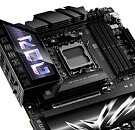GMKtec Lining Up AMD "Strix Halo" APU-powered EVO-X2 Mini PC for Launch in US & Europe
Around the middle of March, GMKtec's EVO-X2 Mini PC design attracted international media attention—thanks to Dr. Lisa Su's autograph adorning a special presentation sample. During festivities, this relatively young Chinese brand—founded back in 2019—introduced the "world's first" AI mini PC equipped with AMD's Ryzen AI Max+ 395 APU. This flagship "Strix Halo" chip leverages Zen 5 and RDNA 3.5 technologies; the latter aspect forms the basis of an impressively potent Radeon 8060S iGPU. This integrated graphics solution has surpassed or matched some worthy (previous-gen) discrete competitors, and apparently performs admirably in LLM inference workload scenarios. At the tail end of March, GMKtec opened up pre-orders for its $2000+ headline product—starting off in China. Back then, potential international buyers were intrigued—many envisioned a pleasing wider distribution of EVO-X2 Mini PC retail stock. Given that GMKtec had semi-recently expanded its sales operation into Europe, hopes were elevated.
As reported by TechRadar last week, Eurozone tech enthusiast prayers were answered—their coverage outlined an intriguing pre-order campaign: "buyers can unlock a reduced pre-sale price of €1,499 for the base model by paying a $100 deposit. Those who want the higher configuration need to place a €200 deposit to qualify for a discounted €1,799 final price. All orders must be completed by May 7 to receive the full discount." Days later, VideoCardz and Notebookcheck noted a similar promotion—rolled out for North American audiences. Officially, the EVO-X2 Mini PC is (tentatively) set to launch on May 20—well ahead of Framework's projected "early Q3 2025" debut shipment of "tiny 4.5L Mini-ITX" Desktop units. Time limited promo prices are in effect until next week—the 64 GB and 128 GB RAM EVO-X2 package are currently discounted: $1399 and $1799 (respectively). As expected, GMKtec's official US webshop also requires pre-order deposits—refer to these details below.
As reported by TechRadar last week, Eurozone tech enthusiast prayers were answered—their coverage outlined an intriguing pre-order campaign: "buyers can unlock a reduced pre-sale price of €1,499 for the base model by paying a $100 deposit. Those who want the higher configuration need to place a €200 deposit to qualify for a discounted €1,799 final price. All orders must be completed by May 7 to receive the full discount." Days later, VideoCardz and Notebookcheck noted a similar promotion—rolled out for North American audiences. Officially, the EVO-X2 Mini PC is (tentatively) set to launch on May 20—well ahead of Framework's projected "early Q3 2025" debut shipment of "tiny 4.5L Mini-ITX" Desktop units. Time limited promo prices are in effect until next week—the 64 GB and 128 GB RAM EVO-X2 package are currently discounted: $1399 and $1799 (respectively). As expected, GMKtec's official US webshop also requires pre-order deposits—refer to these details below.




































































